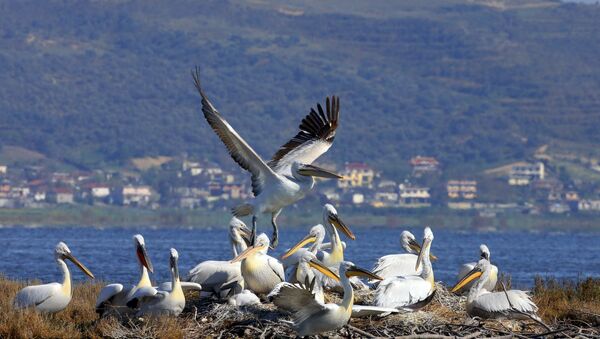Mr. Pacolli is the major shareholder in Mabetex — a company based in Lugano, Switzerland — which wants to build a high-end resort which would be able to cater for 18,280 tourists.
But the 3,342 hectare site at Divjaka, 20 miles south of the capital Tirana, is close to the Karavasta National Park, an important wetland area which is host to endangered species like the Dalmatian pelican, pygmy cormorant, white-headed duck and pallid harrier.
"If it is approved, all the effort to protect the park will equal zero," Sajmir Hoxha, a specialist in nature and biodiversity, told the Exit news website recently.
The resort would cost 1.5 billion euros (US$1.72 billion) and would include a beach, pine woods, farmland and lagoons.
Mabetex is thought to have persuaded several international companies to invest in the project, which would be Albania's first entry into the high-end tourism market.
Albania Spent Years in Political Isolation
Albania was ruled by a hardline regime, under Enver Hoxha, from 1944 until the late 1980s and the Socialist Party, which is currently in power, has its roots in the Hoxha's Party of Labour of Albania, although nowadays it is a social democratic, vaguely left-wing organization.
In the last 25 years Albania has come out of its isolation and is now champing at the bit to join the European Union.
Natural beauty of Divjaka Resort, #Albania. Sun & sea on the small island beach. The refreshing breeze of Mediterranean pines of the resort. pic.twitter.com/dYfydy6Uco
— armandferra (@armand_ferra) 9 July 2017
"The development will allow people to appreciate the most enchanting sights the nature reserve has to offer, and the site's environmental quality will be the starting point for each aspect of the project. A carefully balanced construction work schedule has been planned in areas of the park that over the years have been subjected to wholesale changes," says a glossy presentation on the company's website.
A video, uploaded onto YouTube in 2016, shows the resort, which would include a 15-story five star hotel, bars, a luxury shopping mall, an aquapark and a 18-hole golf course, being carved out of the wilderness on Albania's coast.
The video does not explain how the thousands of tourists would get to and from the resort, which would be surrounded by the national park.
Albania's pelicans return to lagoon 'kingdom'. The wetland has suffered extensive damage and the Dalmatian pelican came close to deserting it. Since the 1980s, Europe's bird population has declined by tens of millions and countless wetlands lost https://t.co/dauM3DQvbZ pic.twitter.com/MTgFEOdkzT
— AFP news agency (@AFP) 16 April 2018
Professor Dr. Sulejman Sulçe, the head of the agro-environment and ecology department at the Agricultural University in Tirana, was hired by Mabetex to look into the ecological impact of the project.
"In the final analysis, considering all elements of social and economic benefits in rapport with environmental interests, it is clear that the project is acceptable," Prof. Sulçe concluded.
Eco-Tourism or Devastation?
He said the resort would boost eco-tourism.
The final decision will be up to Milva Ekonomi, the Socialist Party's Minister of Economic Development, Tourism and Trade but she will no doubt be conscious that 13 percent of Albanians are unemployed and the resort would bring much needed jobs.
Conservationists fear the potential devastation to the wetlands could be ignored because of the economic benefits.
Behgjet Pacolli is Kosova's first billionaire.
— 🇦🇱 FVOA 🇦🇱 (@FVoiceOfAlbania) 30 November 2017
Owner of Mabatex Group, a construction company, he employs Albanians in his company, helped broker a deal in 2004 to release hostages and isn't afraid to show his Muslim identity.
Albanians need more of these politicians. pic.twitter.com/9tGrtRZy4a
The Albanian Ornithological Society say 120 Dalmatian pelicans live in the lagoon at the Karavasta National Park.
The species is listed as "near threatened" species by the International Union for Conservation of Nature.
Dalmatian pelicans have a wingspan of around three meters and are one of the heaviest flying birds in the world.
Around 51,000 birds winter in the Karavasta wetlands, which has special protection under the Ramsar Convention and is part of the Council of Europe's Emerald Network.
As well as birds it is also home to dozens of species of insects, amphibians, reptiles and molluscs.


